
Another Sunny Day in the Tokyo Regional Immigration Bureau: One voyage to getting a visa in Japan
A stroll to the other side
One hot September morning it all started. I was on my way to the beloved island slightly east of Shinagawa where the immigration fortress is located. Since I like strolling, I was walking peacefully over there while enjoying the presence of the seaside, fumy trucks, automobiles and the morning breeze. I was breathing the air of Tokyo; it was a moment of great excitement as I was finally going to get the legal proceedings going and establish my new life in Tokyo. I had arrived on a tourist visa, and was going to change it into a student visa for my Japanese language school, and later on graduate school. I started to look around for the building and was starting to wonder why it would be located so close to many trucks passing by and an incineration plant. Maybe the Japanese government wanted to show that Tokyo is not all about its glitzy environments that may be popular with tourists.
Nevertheless, it was a pleasant walk over there as you get to see new landscapes and learn about different environments. As I was coming closer to the Tokyo Regional Immigration Bureau, I was looking forward to getting acquainted with the bureaucrats of Japan. I have previously had much experience with bureaucrats when I was living in Paris and it was a form of art in knowing how to deal with them. It turns out that there is an art for that in Japan too, alas, not an art that seems to have been equally shared. I arrived at the immigration bureau before they opened the doors and there was a mob waiting outside. That is when I started to realize that it was not going to be as I had expected. I had hoped for a smooth process where I give them my documents and everything would be finished within 30 minutes. There was a gentle elderly man waving a sign which indicated that refugees should follow certain procedures and go another path. I was thinking about all the hopes and dreams of all my fellow immigrants who had come to Japan by whatever happenstance, or reason. Unfortunately, not all of their outcomes turned out to be as fortunate as mine given that I was permitted to stay and get a visa in Japan, at least for a while.

If others are allowed to, that does not mean you are (Aliis si licet, tibi non licet)
While we are all waiting, we share some smiles and the smell of potentiality around us. The doors open and we flock inside each one of us looking for our designated part and dash in various directions. To much of my surprise, there were few people around my counter and I proudly and joyfully took the first queue ticket for the day. Later on, a gentleman turned up and we had a small chat. It turned out that I was at the wrong counter and he had done a similar mistake before. I was redirected to the 2nd floor. Finally, the correct counter seems to appear, and I get my queue ticket.
There were not that many persons waiting before me so I started to rethink that maybe I could be out of there within an hour. As the 5-6 persons before me started to finish up their affairs, I nervously went over my documents again and made sure I had them in good order.
I was greeted in a rather indifferent tone, which signaled professionalism to me and was reassuring. After a few brief moments, the gentlelady looked at me and told me I could not apply for a student visa. This came as a shock to me. I asked her about what I could possibly do and what went wrong. She told me that I could not apply for a student visa in Japan due to the tourist visa status. She further explained that I had to apply from an embassy abroad. Absurdity, I thought, suffering in silence. I kept my stiff upper lip and accepted the judgment. The reasons why it seemed absurd to me were that I could not understand why they would send people to other countries and make them apply at embassies when they could just do the paperwork in Japan which would make sense economically(by employing local labor and having applicants spend money in Japan instead of outside), socially (a warm welcome to immigrants which may then see Japan more positively), and legally (I knew of a preceding case where a tourist visa was changed into a student visa at my language school). However, they probably have their reasons for the praxis and I would have been delighted if they could share them with me so that I can understand both their reasoning and compose eventual counter-arguments.
Don’t move settled things
(Quieta non movere)
My imagination started to get out of control, I had already paid for my lodging and made plans with friends, and started to look for an apartment, which I hoped to find before my classes would start. I was walking out of the building partially devastated partially stoic. I had prepared everything and was looking forward to getting the administrative part dealt with so that I could properly enjoy Tokyo without having to worry about paperwork. I did not understand what I had done wrong and did not get it explained to me. I did not question the bureaucrat because I perhaps trusted that she would know her duty better than I know my rights.
As I got out of the building, I started to search for Wi-Fi so that I could call my language school because they had told me that I could change my visa status in Japan. Finally, I found a connection so I could call the school from skype. I got in contact with the responsible person who seemed surprised because other students had successfully changed their visa status without having to leave the country. The prior case stuck in my mind and I was reminded of due process and equality before the law. Japan’s constitution, should it not guarantee due process and equality before the law(法の下の平等)?

In Defence of Equality before the Law
In fact, it is guaranteed by Article 14 in the Japanese Constitution [1][2].It states the following:
すべて国民は、法の下に平等であつて、人種、信条、性別、社会的身分又は門地により、政治的、経済的又は社会的関係において、差別されない。
Article 14.
All of the people are equal under the law and there shall be no discrimination in political, economic or social relations because of race, creed, sex, social status or family origin.
Japan is also a signatory of The International Covenant on Civil and Political Rights[3][4] which guarantees:
Article 26
All persons are equal before the law and are entitled without any discrimination to the equal protection of the law. In this respect, the law shall prohibit any discrimination and guarantee to all persons equal and effective protection against discrimination on any ground such as race, color, sex, language, religion, political or other opinion, national or social origin, property, birth or other status.
That which harms, often teaches
(Quod nocet, saepe docet)
It is worth taking note of this in detail if you are in a similar situation. Of course, doing more legal research would be even more helpful, however, for this time, I had found my striking point: if a person has been able at the same school under similar circumstances to change his visa type from tourist visa to a student visa, and the Japanese constitution guaranteed equality before the law, ceteris paribus, my visa change ought to also be permitted.
I felt encouraged and doubtful at the same time. If they refused me once, why would they not refuse me twice? If they accept me this time, they would show incoherence with their practices which may beg questions about the whole legitimacy of the immigration bureau and their capacity of being able to ensure due process. The kind person at my language school simply told me to try again and hope that another person would take my file and simply let it pass.
This actually happened, this time, there was a young gentlelady taking care of my dossier. Yet, she looked nervous and it seems that she remembered me from earlier and had perhaps been warned about my returning. She told me to wait. There was a gentleman dressed in a suit next to me with someone sporting a long face. I briefly asked the gentleman if the Japanese constitution guaranteed equality before the law and he confirmed my words. We exchanged a few phrases and I got his business card. It seemed that I was not the only person with worrying prospects about my future visa status.
I shall either find a way or make one
(Aut inveniam viam aut faciam)

The same gentlelady that handled my file before called upon me to speak with her. I realized that it had not gone as planned since the young gentlelady had handed over the dossier to the former gentlelady who had rejected me. She did not seem too happy to see me again and explained the same thing as before. The time had come to make my case in my rusty Japanese.
I had memorized the most important words日本国憲法(にっぽんこくけんぽう) 法の下の平等(ほうのもとのびょうどう) and figured the rest is conversation. I think I started my objection(不服、ふふく) with a しかし、and then it went on. Her first counter-argument was that the Japanese constitution did not apply to foreigners. It is true that the constitution says 国民 that could exclude all the people in Japan who are not citizens. I was then curious about which possible laws that would apply to foreigners, but I was not told this. The debate went on with the other part not being too satisfied. I continued insisting upon the fact that if there is a previous case where this visa transition was accepted, then there should be a universal law guaranteeing the same treatment for others. She told me it did not work like that and I think I told her that the law should be upheld given its prior case.
The debate went back and forth without any real progress. In the end, she went to get her superior who seemed eager to come and explain it to me once and for all. The debate raged on with gentle words from both sides and a tide of impatience was growing. This person seemed to know more about the law and arguing better than the former person, however, she was not able to make her case as to why my visa should not be accepted. They were insisting that the other case must have been an exception and I said that the law has little room for exceptions and that I should be treated equally without discrimination.
After a while, she told me to wait and had called my school. I was waiting for about 20-30 minutes worried about what was going to happen. Had I made the situation even worse by “not being friendly”? Would I be put on some secret blacklist? These were all empty worries. The senior colleague came back with a rather dissatisfied facial expression which I did not know how to interpret. She spoke in a more aggressive tone and told me this was an exception. I said once again that it could not be because it is the law and usually it should recognize fair treatment.
One swallow does not make spring
(Una hirundo non facit ver)
We both knew that we disagreed about the case and she stamped my paper and told me what to do next. I was highly relieved and felt so grateful for my situation and I imagined all the other painful situations of the people who would not argue with the staff and simply leave Japan in order to change their visa status. This was not the end of the story. I went to the next counter and they gave me the waiting ticket. I had to wait for about 2 hours to supply my next documents. In all, it took about 4 hours to finish the whole process and I was grateful that I had brought my own lunch-box that I could eat peacefully while waiting until I started to learn about the case where one person turned aggressive. It happens that a person with cancer was going to be deported to a country where she could not get adequate healthcare and would eventually cease to exist because of that, allegedly. Naturally, this is a complicated decision for all countries to make. However, it may be argued that in the International Covenant on Economic, Social and Cultural Rights[5], of which Japan is a signatory [3], Article 12 would provide some relief:
1. The States Parties to the present Covenant recognize the right of everyone to the enjoyment of the highest attainable standard of physical and mental health.
If this applies to non-citizens, I guess it is debatable as well, especially depending upon one’s political leanings. As a matter of course, some cases end in tragedy but hopefully, fewer than in the past due to the great health improvements that have become more universally available in the last century. Another young gentlelady was crying after probably having had her application rejected. I would say that the immigration bureau is a rather emotive arena. Notably, I would remember the negative cases more strongly than all those cases where people successfully immigrate. Maybe it is taken for granted in those cases and makes some not realize the value of being able to immigrate without too much trouble.
My worries were not over because I still did not know if they were going to accept my application or not. Maybe they were just putting on polite faces and then they would reject me in another format. The 4 weeks I was supposed to wait before the visa application turned out to be almost 6 weeks and since I had moved out of the share house, I had to ask a neighbor to watch out for the letter that would come with the notification telling me that I could pick up my foreign residence card.

Let’s seize, friends, opportunity from this day
(Rapiamus, amici, occasionem de die)
Everything, it seems, turned out to be just fine. No trouble in picking up my card, and no trouble in renewing it later on. The other times did not go quickly, but they proceeded at least without having to make a case. However, even if past experiences went well we cannot be sure about future proceedings. A friend’s parents, who had stayed in the U.S. for 20 years and had their own business, got their renewal of visa denied and it reminded me of the uncertainty we face in many situations, not only those of legal matters.
The lesson to be learned, I would argue, is not necessarily about legal rights, but one of uncertainty and value of information. By uncertainty, I mean that we do not actually know the exact probabilities of the visa acceptance rate, and all the less so for our individual case. The probabilities for arguing again are also unknown. For that reason, we may wish to consider that the expected value (the probability of something occurring times the value of that event occurring) of not having to go abroad and renew one’s visa is quite high. In uncertainty, we can find hope.
By value of information, I mean the rules of the game. In this case, it is partially about legal rules, but also about cultural rules (the employees may be told to do something, which may be incorrect legally). Unfortunately, there are many cases where one may lack information, or knowledge of the rules. This could be about living abroad, scholarships, job applications, making friends et cetera. Nevertheless, we could remember that we are capable of learning and improving upon these areas through various methods. In information, we can find formerly unknown ways.
In the end, some cases may entirely be decided by chance, and there may not be much that one could do. That may be a part of life and it could certainly be considered as unfair. In these cases, I often think of accepting such facts and live with the fact that there is little, or nothing that could have been done about it.
Source:
[1] http://www.shugiin.go.jp/internet/itdb_annai.nsf/html/statics/shiryo/dl-constitution.htm#3sho , accessed 2019.09.30 16:52
[2]https://japan.kantei.go.jp/constitution_and_government_of_japan/constitution_e.html , accessed 2019.09.30 16:53 [3] http://indicators.ohchr.org/, accessed 2019.09.30 16:58 [4] https://www.ohchr.org/Documents/Publications/FactSheet2Rev.1en.pdf , accessed 2019.09.30 16:59 [5] https://www.ohchr.org/EN/ProfessionalInterest/Pages/CESCR.aspx , accessed 2019.10.01


